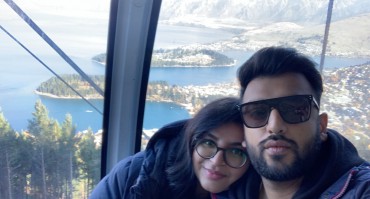Rare Disorders NZ: August update

Rare is everywhere: meet Prerna
"I read somewhere that hope is a passion for what is possible and truly I live by it."
Fair for Rare NZ: Chief Executive update
I would like to start by offering heartfelt appreciation for five years of patronage and support to the rare disorder community and the peak body that represents them, offered by Dame Patsy and wish her all the best for next steps in her journey. We are excited to connect with Dame Cindy Kiro who has an accomplished background in health, wellbeing of children and in science as CE of Te Apārangi – Royal Society of NZ.
The value of having such distinguished dignitaries value and support our community goes beyond words as one of the main things that people with rare disorders express is that they feel abandoned - so this recognition and understanding is invaluable. Our vision is for this recognition to become a reality across our new health and wellbeing sector with improved awareness, education, and most importantly, appreciation of the difficulties involved in living with rare illnesses.
One barrier which is centre stage in the media currently is equitable access to rare disorder medicines, and it was fantastic to have the opportunity to present to the PHARMAC Review Panel and feel our community’s voice was listened to and acknowledged. We eagerly await the outcomes from this review and remain encouraged that the same messages were presented by varied NGOs and organisations.
Other areas of need relate to access to accurate and timely diagnosis, and this will be our topic area for our next Ministry of Health meeting. A vital aspect of diagnosis is having well-educated frontline staff such as community medicine practitioners and midwives, so issues are flagged early and investigations initiated. Excitingly, a workshop on Awareness and Education of Rare Disorders has been accepted for next year’s GPCME conference in Rotorua. This will offer the opportunity to raise awareness of rare disorders and offer solutions for education for medics such as the Rare Disease 101 programme and platform offered in the UK for trainee doctors. This is the first step towards improving attitudes, understanding and, ultimately, outcomes for people with rare conditions.
Our Fair for Rare NZ campaign will have a focus on Children’s Day in November and we will also undertake the NZ Voice of Rare Disorders survey again with your support, so we can offer evidence-based reports to our government on the unmet needs for our community.
All these are steps in the right direction and although it takes patience and tenacity to continue the push for equity, it can lead us to a future New Zealand we will all be proud of.
Nga mihi,
Lisa Foster

PHARMAC Review panel presentation
RDNZ presented a collective response on behalf of all those with medicines access issues who live with a rare disorder to the PHARMAC Review Panel in June.
"We consulted with our collective of rare disorder support groups to ensure we focused on the key issues, plus created a template with messages to make it easy for groups to respond themselves," says CE Lisa Foster. "In total, the panel received 14 submissions from rare disorder groups within our collective."
Read an update by Jaime Christmas, Chief Executive of the NZ Amyloidosis Patients Association, who attended the presentation, along with the full presentation on our website.

Governor-General patronage

Disability Rights Commissioner meeting
Our CE Lisa Foster recently met with Paula Tesoriero, the Disability Rights Commissioner, alongside support group leaders to represent the needs of the rare disorder community.
Read an update by Kelly McQuinlan, President of Ehlers–Danlos Syndromes New Zealand, on our website.

Disorders not so rare: awareness article
"A shift in mindset is needed for rare disorders to stop being considered in isolation, and instead be regarded as a significant factor within health policy frameworks. Patients and clinicians must be involved in the decision-making processes, consideration given to patient quality of life, and provision made for the impact on carers."

Government to mandate folic acid in flour
RDNZ has campaigned for more than a decade for the government to mandate the addition of folic acid to flour to reduce the number of babies born with spina bifida and other neural tube defects.
"Rare Disorders NZ supported the Ministry for Primary Industries proposal in 2019 and is pleased to see this recommendation finally being followed to protect babies," says RDNZ CE Lisa Foster.
The policy, to be introduced over two years, would ensure all non-organic wheat flour for making bread is fortified in a move the Government says could prevent between 162 and 240 neural tube defects – birth defects of the brain, spine or spinal cord such as spina bifida – over 30 years.
New Zealand’s rate of neural tube defects was high compared to other countries who have a mandatory fortification approach, such as Australia, Canada, and the United States.
“This is about protecting babies. Low folate levels in mothers cause neural tube defects that result in the death of babies, or life-long disability,” Associate Health Minister Dr. Ayesha Verrall said.

Ministry of Health meeting: raising awareness of rare disorders
RDNZ recently convened a meeting with Ministry of Health officials to amplify the collective voice of people living with a rare disorder, with a focus on GP awareness and education.
A number of support group leaders attended this meeting and spoke about their experience of living with a rare disorder in New Zealand.
Read an update by Samantha Lenik, Vice President of the New Zealand Pompe Network, on our website.
The outcome of the meeting was for RDNZ to establish a working group to keep the momentum in this area. If any of the RDNZ support group leads would like to be part of this working group, please email RDNZ.
